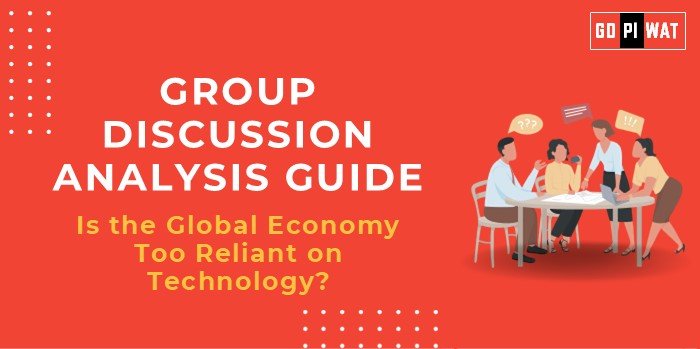📋 Group Discussion (GD) Analysis Guide: Is the Global Economy Too Reliant on Technology?
🌐 Introduction
- Opening Context: The global economy is increasingly driven by digital innovation, contributing to GDP growth, job creation, and global connectivity. However, over-reliance on technology introduces risks such as cyber threats, environmental challenges, and systemic vulnerabilities.
- Topic Background: In the last decade, technology has become integral to sectors like healthcare, finance, and manufacturing. With digital industries growing faster than traditional sectors, concerns about sustainability and resilience have become pivotal.
📊 Quick Facts and Key Statistics
• 🌍 Global Digital Economy: Accounted for over 15% of global GDP in 2024, growing 2.5 times faster than the physical economy over the last decade.
• 🤖 AI’s Contribution: Predicted to add $19.9 trillion to the global economy by 2030, constituting 3.5% of global GDP.
• 🔐 Cybersecurity Costs: Cybercrime costs could reach $10.5 trillion annually by 2025, emphasizing the economic risks.
• ♻️ E-Waste: 62 million metric tons of electronic waste were generated globally in 2022, with only 25% properly recycled.
• 🌐 Internet Dependence: Over 4 billion people worldwide relied on internet connectivity as of 2020, demonstrating its foundational role in daily life.
• 🤖 AI’s Contribution: Predicted to add $19.9 trillion to the global economy by 2030, constituting 3.5% of global GDP.
• 🔐 Cybersecurity Costs: Cybercrime costs could reach $10.5 trillion annually by 2025, emphasizing the economic risks.
• ♻️ E-Waste: 62 million metric tons of electronic waste were generated globally in 2022, with only 25% properly recycled.
• 🌐 Internet Dependence: Over 4 billion people worldwide relied on internet connectivity as of 2020, demonstrating its foundational role in daily life.
👥 Stakeholders and Their Roles
- Governments: Drafting regulations, investing in digital infrastructure, and protecting against cybersecurity threats.
- Private Sector: Innovating technologies, driving productivity, and addressing environmental impacts.
- Citizens: Adopting digital tools for work, education, and communication while adapting to shifts in employment trends.
- Global Institutions: Promoting digital equity and framing international standards for technology governance.
🏆 Achievements and Challenges
- Achievements:
- 📈 Economic Growth: Digital industries now outpace traditional sectors in growth, driven by innovation and efficiency.
- 🤖 AI Integration: Boosted productivity and transformed healthcare, finance, and manufacturing.
- 🌐 Global Connectivity: Enabled businesses and individuals to communicate and trade across borders seamlessly.
- Challenges:
- 🔐 Cybersecurity Risks: Rising costs of cybercrime threaten economic stability.
- 🌍 Digital Divide: Millions remain disconnected, limiting equitable access.
- ♻️ Environmental Impacts: E-waste management remains a significant challenge.
- Global Comparisons:
- ✅ Estonia: A pioneer in digital governance and e-services.
- 🌆 China: Leads in AI adoption and smart city technologies.
- 📚 Case Study: The 2021 ransomware attack on Colonial Pipeline demonstrated the vulnerability of critical infrastructure reliant on technology.
🗣️ Effective Discussion Approaches
- Opening Approaches:
- 💬 Highlight the $19.9 trillion economic contribution projected from AI by 2030.
- ♻️ Use the e-waste statistic as a segue into discussing environmental sustainability.
- Counter-Argument Handling:
- 📋 Acknowledge: The benefits of technological dependence.
- 🔍 Address Risks: Focus on digital inequity and cybercrime mitigation strategies.
🔍 Strategic Analysis of Strengths & Weaknesses
- 🏅 Strengths: Accelerated innovation, productivity, and global connectivity.
- ⚠️ Weaknesses: Over-reliance exposes vulnerabilities, including job displacement and cybersecurity risks.
- 🌱 Opportunities: Sustainable growth through digital equity and advanced technologies like AI.
- ⚡ Threats: Environmental degradation and geopolitical tech rivalries.
📋 Structured Arguments for Discussion
- Supporting Stance: “Technology’s role in driving economic growth and global progress is unparalleled.”
- Opposing Stance: “Over-reliance on technology exposes economies to cyber risks and environmental costs.”
- Balanced Perspective: “While indispensable for progress, the global economy must address the risks of technological dependency.”
🎓 Connecting with B-School Applications
- Real-World Applications: Projects on AI-driven business models, cybersecurity, or sustainable tech innovations.
- Sample Questions:
- 💡 “How can industries balance innovation with cybersecurity?”
- 💡 “What strategies can governments adopt to address the digital divide?”
- Insights for Students:
- 📖 Explore strategies to mitigate cyber risks.
- 🌱 Evaluate the role of technology in sustainable business practices.


